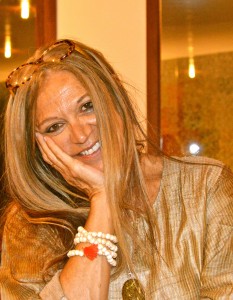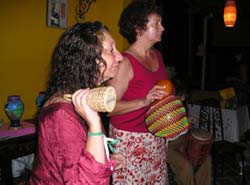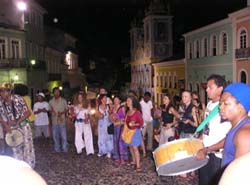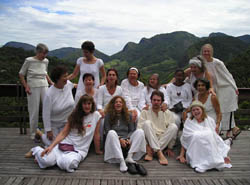 This is the interview with Silvia Nakkach, an innovative, award winning composer, multi-instrumentalist, voice culturist and author. Her specialties include music to aid in the healing process. Founding director of the Vox Mundi Project, an organization dedicated to the research, education, preservation and performance of sacred vocal arts, Ms. Nakkach teaches her students the art of sound healing. In this interview, she tells SevenPonds a little about her practice.
This is the interview with Silvia Nakkach, an innovative, award winning composer, multi-instrumentalist, voice culturist and author. Her specialties include music to aid in the healing process. Founding director of the Vox Mundi Project, an organization dedicated to the research, education, preservation and performance of sacred vocal arts, Ms. Nakkach teaches her students the art of sound healing. In this interview, she tells SevenPonds a little about her practice.
Antal: Thanks for joining us, Silvia.
Silvia: It’s my pleasure, Antal.
Antal: Tell us a bit about your work in musical healing. How did you find your calling in this line of work? How did you get started?
Silvia: I’m a musician and composer and professor of music and sound healing, which we mostly go through with music. We also do simple sound, tonalities, but we’ll get to that. Mostly I am a composer and professor of music and conscience, and I am a musical healing psychologist. I’ve been a musician and in this line for more than 40 years. I started off a bit more technical, and then moved into a work where I could be more sensitive to others’ suffering. I’ve always been very sensitive to others’ suffering, and this led me to working with the terminally ill. One of my passions is to work with people in the last passages of their life, and the only thing they can do is hear music. I had experience with my own family, playing music at their bedside, and I got into hearing, listening, being with the ill. I work with nurses, doctors, musical therapists, sound healers, and a lot of my family died, so I used my own experience with them for other families who had someone dying. And I was a clinical psychologist, and I started connecting that with my work, my bedside playing, so everything I do now is to help people. That is my mission, my vision, and my service in the world. And I can accompany people through the end, and it’s necessary, for someone to do that, to be there. People who are near death are very sensitive to sound. They want to be connected to the divine, and music can go directly into that sacredness, without the mediation of thought, of the brain.
Antal: What kind of music do you play? What is healing music?
 Silvia: Any kind of music can heal, depending on what you play, depending on who you play it for. We use music that has not much melody. There is a whole system I created — we go with music that is more melodic, with ambient harmonies, ringing harmonies, but still progression and a sense of journey. The culture of music is important, so we play jazz, classical, country, rock and roll, but music with less rhythm. We avoid too much rhythm. When we play East Asian or South Korean we will play in the major pentatonic scales.
Silvia: Any kind of music can heal, depending on what you play, depending on who you play it for. We use music that has not much melody. There is a whole system I created — we go with music that is more melodic, with ambient harmonies, ringing harmonies, but still progression and a sense of journey. The culture of music is important, so we play jazz, classical, country, rock and roll, but music with less rhythm. We avoid too much rhythm. When we play East Asian or South Korean we will play in the major pentatonic scales.
Antal: Is this improvisation?
Silvia: Sometimes we are improvising, sometimes we are playing songs. Sometimes we are playing nothing at all, sometimes the silence is what the patient wants. The most important thing is to be there. The protocol is being, not doing, not creating sound that is not necessary. And culture will play an incredible role. We play a lot with Asian people in the Bay Area, and you have to respect that, if that’s what they want to hear. You have to ask first what kind of music they would like to hear.
Antal: Tell us about your playing and your teaching technique. What is your style? How do you develop your own playing?
 Silvia: What is my style? At my level it’s hard to say. I play ancient and contemporary sound and music healing modalities. This is what I teach my students. And they learn from the shamans, spirits, doctors, clinicians, scientists. We play music, and they also learn how to play the harp. They have to be able to play anything, whatever a patient’s needs are. We teach them forms to play music, to calm the mind, to make it sensitive to positive intervention, and my title is to play music for any time, not just for dying. Music is always healing. We create a human resonance. Music healing is not a brand, it’s not a product, so we teach students to find the empathic resonance. That will help people to communicate in a healing manner. I actually don’t really like the term musical healing. It’s not music healing, it’s human resonance. Music healing is a New Age idea, and I’m not New Age.
Silvia: What is my style? At my level it’s hard to say. I play ancient and contemporary sound and music healing modalities. This is what I teach my students. And they learn from the shamans, spirits, doctors, clinicians, scientists. We play music, and they also learn how to play the harp. They have to be able to play anything, whatever a patient’s needs are. We teach them forms to play music, to calm the mind, to make it sensitive to positive intervention, and my title is to play music for any time, not just for dying. Music is always healing. We create a human resonance. Music healing is not a brand, it’s not a product, so we teach students to find the empathic resonance. That will help people to communicate in a healing manner. I actually don’t really like the term musical healing. It’s not music healing, it’s human resonance. Music healing is a New Age idea, and I’m not New Age.
Antal: How do people make use of your music in a therapeutic setting?
Silvia: There is an article on my website called Devotional Music Therapy, and Music at the End of Life, which is the same, with all the information. It’s a chapter from my book called Music Therapy at the End of Life.
Antal: We’ve covered groups that played crystal bowls in the past who reach a resonance and soothing sound that way. What do you think about crystal bowls?
Silvia: Not in that plane, I don’t play them. I’m a musician, my students are mostly improvisational, very multi-cultural, we always ask, “What would you like to hear now?” No, I don’t want to hear that thing, I would like to hear some harp. Yes. “Would you like to hear some drums?” No. My students have to learn a lot of music. I like the Tibetan bowls, the bowls that are made of metal, but I don’t like crystal bowls, they generate all kinds of pain, can cause suffering. We play very soft music at the end of life.
Antal: Do you work with the hospice and care teams?
Silvia: We collaborate with hospice and the hospital in their treatment regimen. You have a meeting with them and ask them how long and you enter into the room for as long as the patient wants or the doctor wants. There’s no formula. It’s very important that we stay very sensitive to the dictates of the room and the flow. If there’s a patient nearby then we can’t play too loud. If the doctors are performing a procedure or if the patient is on a certain kind of medication, then we shouldn’t play at that time. We’re a part of the process, and we have to respect that. We can’t ever impose anything.
Antal: You’ve pioneered the practice of something called Yoga of the Voice. Can you tell us a bit about that?
Silvia: Yoga of the voice is a system of, a systemic approach to free the voice and self-expresssion of music and healing modalities. It combines ancient singing, chanting, music therapy, and works with the breath, works with concentration, works with the body. We go through Indian music, which is by the Rajas. We incorporate the use of sound vibration, and integrates many purposes to free the voice, free the mind, obtain a sense of selfe and learn a part, learn a repertoire, learn a state. But it’s the practice, a system that I developed all designed to free your voice and your self. It starts one way and ends another way, a system of sound, voice and movement.
Antal: Well, thank you so much for your time, it’s been an honor.
Silvia: Of course, Antal.
Antal: Do you have any final words for our readers who might be interested in learning about sound healing, or music therapy?
Silvia: My advice is to be in music. Listen to music. Sing, move and practice yoga. Meditate at least once every other day for 21 minutes; that’s very important. Do what you have to do to clear your mind and empty yourself. And then your whole consciousnes, your conscience on how to help people will be illuminated. Listen to more music, sing more music and try to do it every day. And remember to meditate, at least every other day, so your mind becomes in the necessity of the mind. Music and healing. These can help each other.
Antal: Again, thank you so much.
Silvia: My pleasure.

 What is the Nature of Sound Healing? An Interview with Silvia Nakkach
What is the Nature of Sound Healing? An Interview with Silvia Nakkach




 First the Wealth Gap, Now the U.S. Has a Growing Health Gap
First the Wealth Gap, Now the U.S. Has a Growing Health Gap

 Our Annual Seven Holiday Gifts for Someone Who Is Grieving, 2024 Edition
Our Annual Seven Holiday Gifts for Someone Who Is Grieving, 2024 Edition














